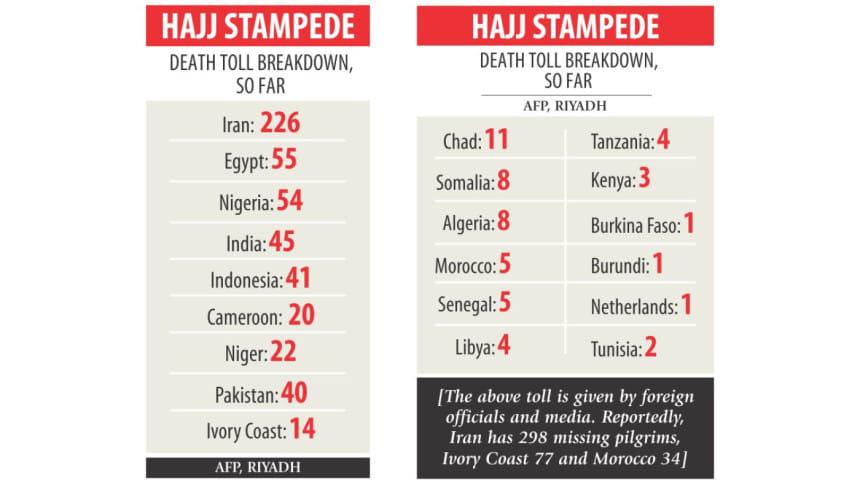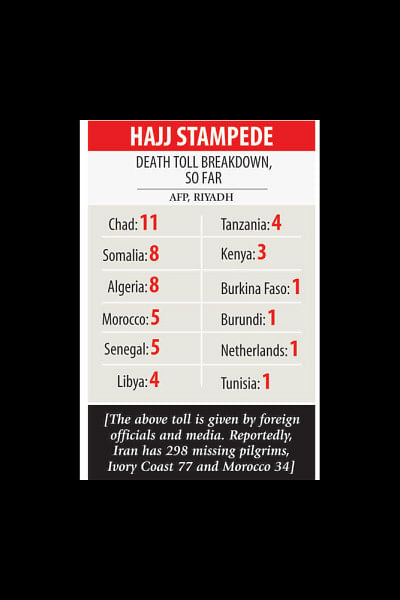Stances of Saudi, Iran worrisome

The tragic death of around 800 Hajj pilgrims in Makkah may or may not have been caused by the Saudi's faulty management but it has brought the simmering hostility between Saudi Arabia and Iran to a boil.
The latest deaths by stampede at the Hajj, one of the biggest religious gatherings in the world, have prompted Iran to launch a passionate war of words against Saudi Arabia.
Riyadh has countered by blaming the Iranians themselves. They accused a few hundred Iranians of causing the stampede by violating regulation.
Pro-government media in both Riyadh and Tehran have been publishing reports supporting the claims of their own governments.
Relation between the two Muslim states, however, was warm in the 1960s and almost to the end of the 1970s when the two countries worked together to defeat communism in countries like North Yemen, Zaire, Somali and Oman with US support.
But the 1979 Islamic Revolution in Iran changed all that. Their relations soured and turned them into archenemies like India and Pakistan in the South Asian region.
After the revolution, Tehran started to view Saudi Arabia as the proxy of the "Great Satan," the US.
Iran's supreme leader Ayatollah Khomeini was a vehement critic of the Saudi monarchy. Riyadh considered Tehran's activities as provocative to foment revolution in Saudi Arabia and other Gulf States.
Saudi Arabia was not shy to strike back either. It supported Saddam Hussein's plan to invade Iran when the Iraqi leader visited Saudi Arabia in 1980.
When the Iraqi invasion started in September 1980, Riyadh became its main financial backer. It also encouraged other Arab states of the Gulf to do so.

The depth of bitterness of the Saudis came out in a comment of King Abdullah on June 5, 2010 to the then French Defence Minister Herve Morin: "There are two states in the world that do not deserve to exist: Iran and Israel," according to the influential magazine Foreign Policy of June 29, 2010.
U.S. diplomatic cables released by WikiLeaks showed Saudi leaders, including King Abdullah, pushing Washington to take a tough stance, including the possible use of military force, against Iran, according to an October 12, 2011report by Reuters.
Riyadh did not hesitate to publicly oppose Washington's signing a nuclear deal with Tehran this year despite being a strong US ally.
There are some crucial aspects including jockeying for regional leadership that are the underlying issues in the rivalry between the two Gulf countries.
Khosrow Soltani Kaseb, a senior journalist based in Tehran, explained some of them in an opinion piece "Iran-Saudi Arabia: a troubled affair" in November 2013 for Aljazeera.
He said the most important areas of rivalry and difference between Tehran and Riyadh range from the crises in Syria, Bahrain and Egypt to developments in Lebanon, Palestine, Yemen and Iraq; from issues of the Islamic world and religious differences to Iran's nuclear programme.
The disaster at the Hajj is merely adding venom to their mutual acrimony, according to Reuters.
"But a deepening of already profound mistrust between the conservative Sunni kingdom [Saudi Arabia] and the revolutionary Shiite theocracy will make the task of stabilizing the Middle East's many trouble spots even harder to achieve than it already is" said Reuters in its report yesterday.
It is not for the first time Tehran has accused Saudi Arabia of mismanaging the Hajj.
Relations between Saudi Arabia and Iran were severed in April 1988. Their relations were strained almost to a breaking point in July 1987 when 402 pilgrims, 275 of them Iranian, died during clashes in Makkah.
After the worst tragedy in 1990 when more than 1400 Hajj pilgrims were killed in a stampede, the Iranian President Hashemi Rafsanjani had said the tragedy proved the Saudi Royal family is incompetent to administer Islam's holiest site.
Saudi Arab's generous relief to Iran after an earthquake might have improved their relations but Rafsanjani harsh remarks ended any hopes.
Since the1990 stampede, Saudi authorities have implemented many projects for better Hajj management.
But, recurrence of tragic incidents during the Hajj has not stopped. More than 1300 Hajj pilgrims have been killed from 1994 to 2006 in stampedes, excepting death of 343 in fire in 1997.
The ongoing war of words between Saudi Arabia and Iran may serve their political purpose, but the greater Muslim world wants Saudi Arabia to take further measures to prevent recurring of tragic incidents during Hajj in coming days.

 For all latest news, follow The Daily Star's Google News channel.
For all latest news, follow The Daily Star's Google News channel. 



Comments